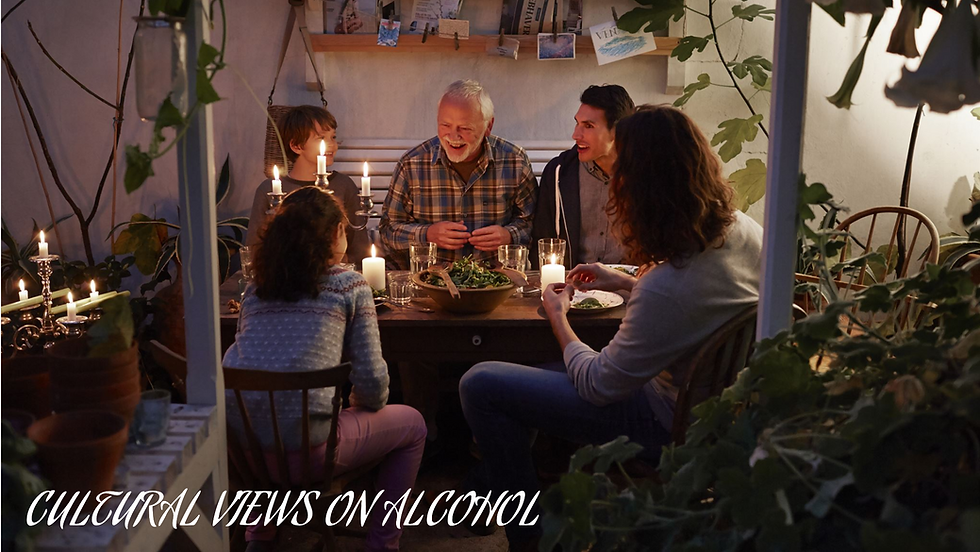Cultural Views on Alcohol: How Different Societies Handle Alcohol Use
- Admin
- Sep 25, 2024
- 3 min read

Introduction: (www.youtube.com/kneetiegorungo)
Alcohol has been a part of human culture for thousands of years, with its use deeply embedded in social rituals, religious practices, and daily life. However, the way different societies view and regulate alcohol varies widely across the world. Cultural, religious, and legal factors all shape how alcohol is consumed, perceived, and controlled within a given society. In this article, we will explore how different cultures handle alcohol use, examining the diverse perspectives that exist and how they influence drinking behaviours and policies.
Alcohol in Western Cultures
In many Western societies, alcohol is seen as an integral part of social life. Countries like the United States, the United Kingdom, and much of Europe have a culture of moderate to heavy social drinking, especially in social settings such as parties, holidays, and celebrations. Alcohol is legal and widely available, and its use is often normalized through advertising, media, and societal customs. In countries like France and Italy, alcohol, particularly wine, is consumed regularly with meals, and there is a strong emphasis on enjoying it in moderation as part of the culinary experience.
However, despite the normalization of alcohol, Western cultures also face challenges related to overconsumption. Binge drinking, especially among young adults, is a common issue in places like the UK and the US, leading to public health concerns. As a result, these societies have implemented legal measures, such as age restrictions, public intoxication laws, and regulations on alcohol sales to manage alcohol-related problems.
Alcohol in Middle Eastern and Islamic Cultures
In stark contrast to many Western societies, alcohol consumption is heavily restricted or outright forbidden in many Middle Eastern and Islamic cultures. For countries like Saudi Arabia and Iran, Islamic law, or Sharia, prohibits the consumption of alcohol, and the sale and use of alcoholic beverages are illegal. This stems from the religious belief in Islam that alcohol intoxicates the mind and leads to immoral behaviour, which contradicts the principles of the faith.
While these prohibitions exist, alcohol consumption still occurs in some regions, though it is often done discreetly and comes with severe legal consequences if discovered. In other Islamic-majority countries, such as Turkey and Indonesia, alcohol is more readily available, but its use is still culturally frowned upon or limited to certain social settings. These differing attitudes highlight the significant role religion plays in shaping a society's view of alcohol.
Alcohol in East Asian Cultures
East Asian societies, such as Japan, China, and South Korea, have their own unique cultural approaches to alcohol. In these countries, alcohol is often associated with business, celebration, and social bonding. In South Korea, for instance, drinking with colleagues is seen as a way to strengthen professional relationships, and the consumption of soju, a traditional Korean liquor, is widespread. Similarly, in Japan, drinking after work with coworkers, known as “nomikai,” is a common practice, serving as a means of building camaraderie and trust in business environments.
However, East Asian societies also place high value on moderation and social harmony. While drinking is encouraged in social settings, it is expected that individuals maintain control and avoid disruptive behaviour. This balance between celebration and self-control reflects broader cultural values around respect, discipline, and maintaining societal harmony.
Conclusion:
Cultural views on alcohol are deeply rooted in the social, religious, and legal frameworks of each society. From the permissive drinking cultures of the West to the strict prohibitions in Islamic societies, the way alcohol is handled varies greatly across the globe. Understanding these cultural differences is essential for promoting responsible drinking and addressing alcohol-related issues within different cultural contexts.
The domain www.dubaitelemedicine.com is for sale. Please contact us at www.kneetie.com
#KneeTie #Stroke #youtube/kneetiegorungo #DubaiTelemedicine

















Commentaires